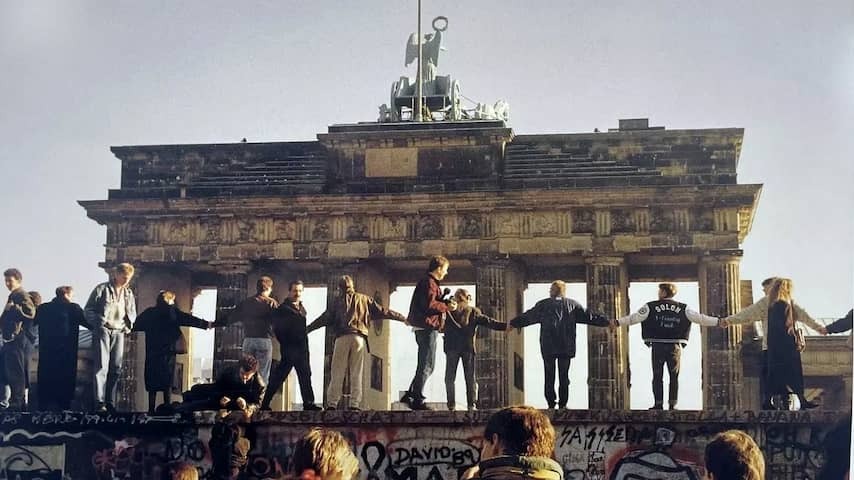
Germany is Celebrating Today that East and West Became One Country Again in 1990. But 35 years after Reunification, Few Germans Feel that the East and West of the Country Are Really Working Together.
On November 9, 1989, The German People Pushed Aside the Iron Curtain. Thousands of People Climb the Berlin Wall and Stand in Places Where They Could Have Expected a Hail of Bullets A Day Earlier. Strangers from East and West Fall Into Each Other’s Arms, Crying and Cheering, While the Border Guards Still Present Look On In Astonishment.
Images of the fall of the Wall are deeply etched in the European collective memory as the moment when East and West Germany came together again after their separation in 1945. Yet that is not celebrated on November 9. That has to do with other matters with a darker place in that memory: the end of the German Empire (1918), Hitler’s Beer Hall Putsch (1923) and Kristallnacht (1938) Took Place on the Same Date.
The Choice Fell on a More Neutral, Formal and Even Slightly Official moment: The Signing of the Unification Treaty on October 3, 1990.
That is reflected in How the Day is celebrated, Says Aline Sierp, Associate Professor of European History and Memory Studies at Maastricht University. “Compare it to King’s Day in the Netherlands. That is really a public festival. The Celebration of German Unification is much more formal, with serious speeches and so on.” It is a National Holiday, So Most People Are Off. “But if you were to ask them that is actual on October 3, I don’t think many germans could tell you.”
FEWER Germans See Country As One Whole
At the time of unification, there was already a differentence between how it was viewed at Government Level and in the Experience of the German Citizen. That gap has widend over the decades.
In a recent Poll on Unification by Opinion Researcher Forsa, 23 percent of respondents from the Former East Germany Say That the Country Has Really Become One Whole Since Unification. That was still the case for 43 percent of respondents from that part of germany in 2017. In the West, 37 percent hold that view – also not a resounding figure.
Economic Differences between East and West are persistent
“On the one hand, unification is one of the most important Historical Events of the Past Hundred Years. Germans are very proud of it,” Says Roland Löffler, Director of the Sächsische Landenszentrale Für Polish Bildung. “On the other hand, the debate between East and West Has Become QUITE Bitter in the Past Ten years. East Feels unaccepted and West Thinks that East Complains Too Much, For Example About The Economy Or Migration.”
The Economy in the Former East Germany Performs Better Than In The Visegrád Countries (Poland, Hungary, Czech Republic and Slovakia), But Lags Behind That of the Former West Germany. Accordance to the iWh Think Tank, The East Has Reached a Comparable Economic Level of 75 to 80 percent Compared to the West. After that, the gap has stalled. For Example, Productivity Remains Considerably Lower at Medium-Sized and Large Companies in the East Than In The West.
“One of the biggest differences is that no large company has a head office in the east. None of the forty largest companies in Germany are located here. Of the medium-sized listed companies, only three are located in the east. Large foundations, church organizations and trade unions are also located in The West, “Says Löffler. “That quickly mean that you have to go there if you want to make a career.”
Accordance to the political scientist, that has contributed to one of the biggest economic obstacles for Eastern States: the composition of their population. The East was the young part of the country at the time of unification, but is now the eldest. Decades of Brain Drain Have Left Deep Scars.
Political Extremes Benefit from General Dissataffaction
Disappointment about the benefits of reunification is reflected in German politics. The Radical Right-Wing Party Alternative für Deutschland (AfD) has its power base in the Former East Germany and Quickly Grew Into The Largest Opposition Party in the German Parliament.
That fits Within the Broader European Trend of the Rise of Right-Wing Populism, Says Sierp. “If you feel that you have no influence, you look for the extremes. Because that gives you the feeling that you still have something to say.” For a long time it was assumed that certain political movements could no longer gain a foothold in germany. “There is a counter-movement to that constant debate about responsibility for things from the past. ESpecany many young germans say: this has nothing to do with us.”
Löffler: “Many people in The East Still Have A GDR Mentality. That was a small country, where the population was very shielded from the outside world by the leaders. Those people were faced with a major change: from There fixed there is a fixed there is a fixed those fixed there is a fixed those fixed those fixed those fixed those fixed those fixed those fixed those fixed those fixed there is a fixed those fixed those fixed those fixed those fixed those fixed those fixed those fixed those fixed there is a fixed there. Migration, Corona, Ukraine.
More than a Quarter of a Century After The Embraces Above the Rubble of the Berlin Wall, There Is Still Work To Be Done, Löffler Concludes: “The Big Lesson We Have To Learn From Unification Is That We Germans Know Transformationmations: From Empire, to From Empire, to Four and Fppire, to Commitismations. Democracy.